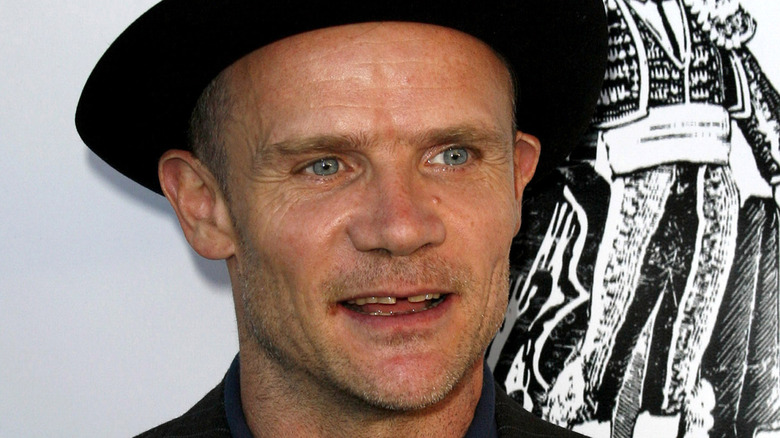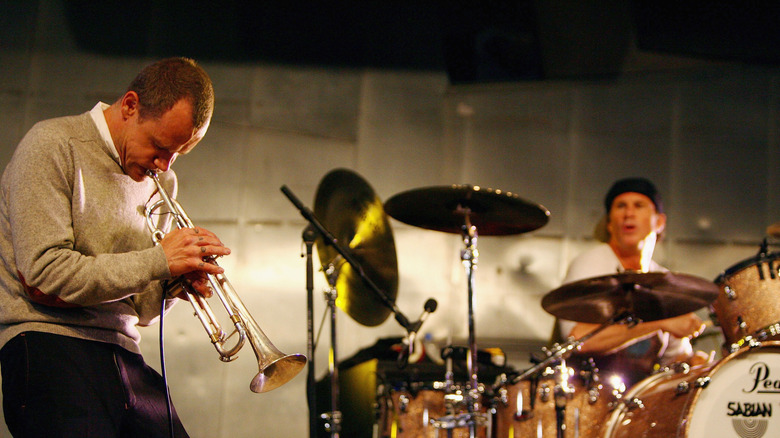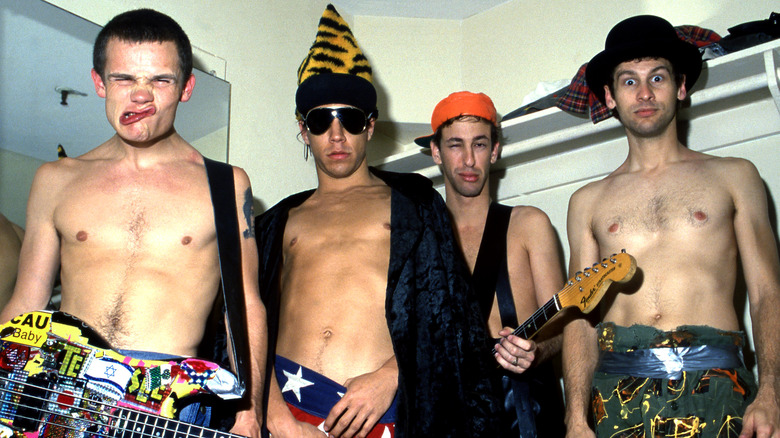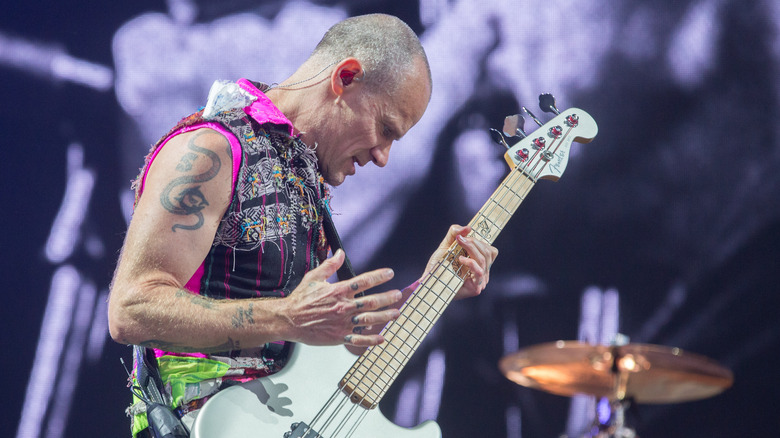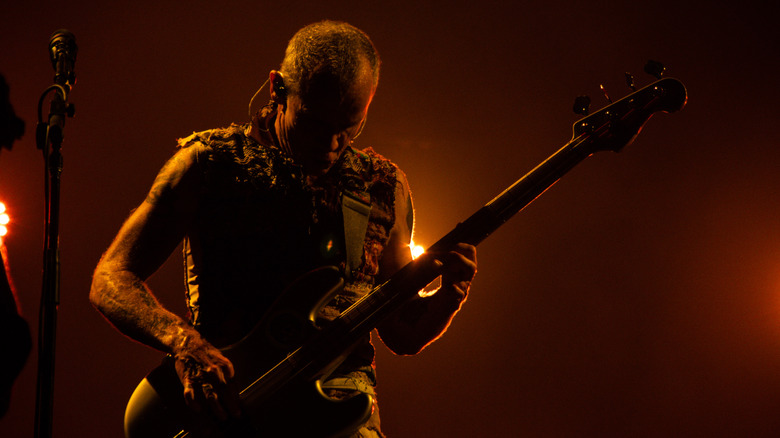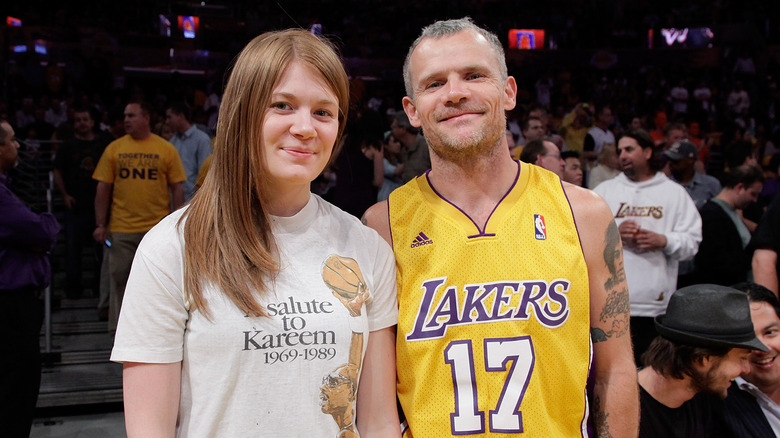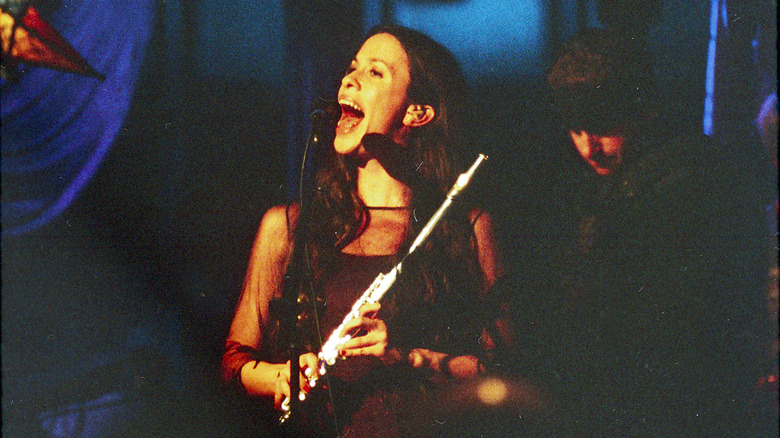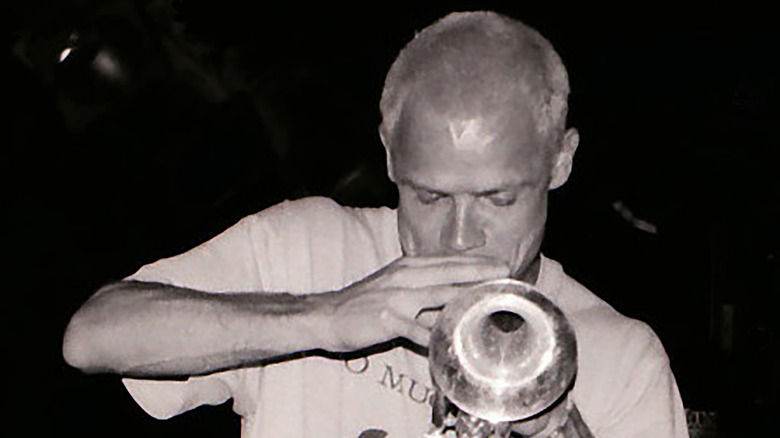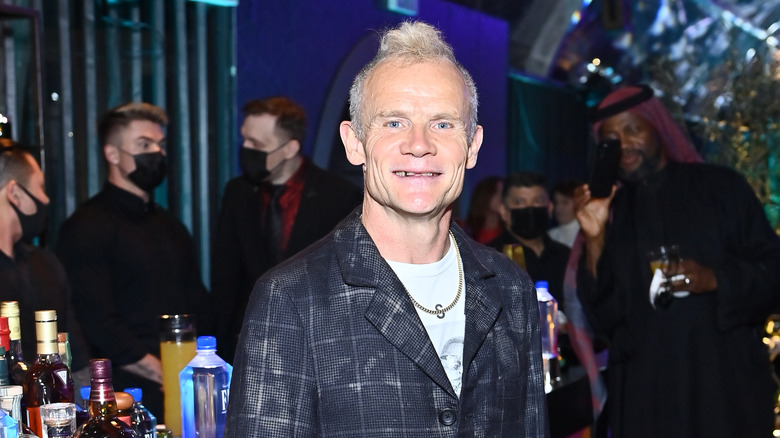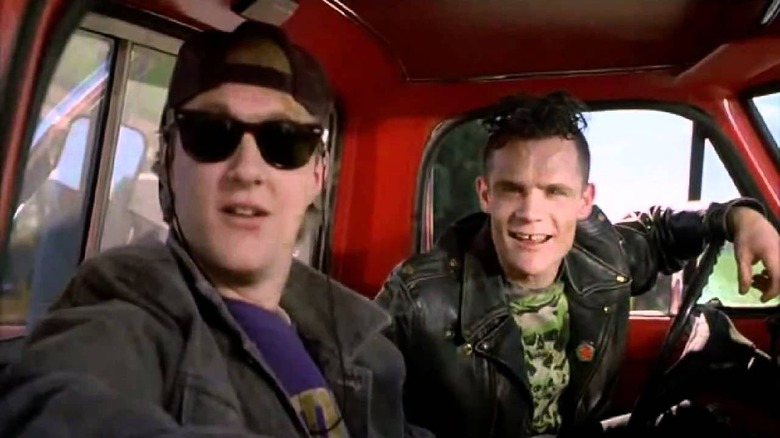The Untold Truth Of Flea From Red Hot Chili Peppers
To outsiders who are only vaguely familiar with the Red Hot Chili Peppers, Flea is well-known as a talented bassist, but he might also seem like a rather strange individual who is a bit too fond of taking his clothes off onstage. Even the fact that he's simply known as Flea might seem a little odd, but fascinating. And while all of this is true, there is so much more to the musician than his wild, yet highly entertaining performances.
The rock star has an inquisitive mind and relishes the pursuit of knowledge, and he is so introspective that he wrote hundreds of pages about his early life before the formation of the band that made him famous. He is passionate about serious issues, and he has the drive to put his resources to good use and make a difference. Here are the stories behind the complex character called Flea.
There was a rumor that Flea was partially Aboriginal
Flea may have lived most of his life in the U.S., but he is originally from Australia, and his family moved to New York when he was a young child. While living in Rye, a suburb of New York City, Flea and his sister, Karyn, already felt like outsiders with their thick Australian accents, so they decided to have some fun with their fellow classmates. In his book "Fornication: The Red Hot Chili Peppers Story," Jeff Apter interviewed Flea's dad, Mick Balzary, who claimed that his children made up nonsense words and pretended to talk to each other in an Aboriginal language.
From that joke, the rumor spread that Flea had a bit of Aboriginal blood. There was absolutely no truth to it, but the rumor persisted even after he became an adult — so much so that some people believed the Red Hot Chili Peppers song "Walkabout" was an allusion to Flea's Aboriginal roots.
Flea's stepfather and his jazz buddies got him into music as a kid
His early life in America was a tumultuous time for Flea. His parents divorced, and the family moved to Los Angeles a few years later. His mother's new boyfriend, Walter Urban Jr., became Flea's stepfather, but the man was a heavy alcohol user, which made life difficult for the future rock star. On the other hand, his stepfather's great love of music inspired the young Flea to also take up the art. Urban would often invite his jazz friends over to jam for hours, and Flea loved every moment of it, especially seeing his stepdad perform.
When talking to The New York Times, Flea recalled, "I remember watching him play when I was a kid and the intensity when he would go for it. Just viciously attacking his instrument, with his eyes closed and sweating, and just, like, going off. Whether he was conscious of it or not, he was exorcising the demons within him and taking the torment of his life and using it as an energy to make something truly beautiful. ... He really gave me gifts that are such a huge part of who I am."
Hillel Slovak introduced him to rock & roll
The unique atmosphere at home meant that Flea was fully immersed in jazz music, and he had so much respect for the genre that he cared much less about all the others. His disdain for punk music was so great, in fact, that he hated the first punk performance he ever saw. As an aspiring jazz musician, Flea's favorite instrument was the trumpet, which he began to play when he was 9 years old.
However, Flea's perspective on music changed dramatically after he met the future guitarist of the Red Hot Chili Peppers, Hillel Slovak. When they were 18, Flea, Slovak, and lead singer Anthony Kiedis all lived together in Hollywood, where Slovak would open his best friends' eyes to music they were unaware of or had previously dismissed.
In "Behind the Sun," a book by Slovak's brother James, Flea talked about the impact Slovak had made and said, "Hillel was a huge influence on my life. I never would have begun to play the bass [without his influence]. I looked up to him, I loved the way his hair fell on his shoulders and the way he slung his red Messenger guitar around like a rock stud." According to Fornication, Flea went on to admit, "I [had] heard rock music, but it sounded stupid to me. When I met Hillel, he started playing lots of rock music for me, and I got into Led Zeppelin and Jimi Hendrix."
The iconic nickname stuck early on
Like all superstars with unique stage names, Flea was not always called that — he was once just Michael Peter Balzary. That began to change when Balzary, Anthony Kiedis, and their good friend, Keith Barry, were teens and about to go on a ski trip. The group decided to call each other by nicknames, so Balzary became Flea. Later, Barry began to realize that the name was perfect for his friend because it was a reflection of his animated and mercurial character. Even Flea agreed it fit.
But he was not truly Flea until he tried out for the punk band called FEAR. Hillel Slovak's influence had changed Flea's taste in music so much that he began to have deep respect for the rock genre. Being a part of the L.A.-based band was an incredible opportunity.
At the audition, the bassist was asked his name, and he panicked a little because he wanted to sound cool. In his memoir, "Acid for the Children," the rock star said, "I'd been called Flea here and there before, amongst other nicknames, but without thinking, and wanting to appear like a punk rocker, I blurted out, 'I'm Flea.'" Regardless of the nerves, the bassist smashed the audition and became the band's newest member. He's been known as Flea ever since.
Flea is highly spiritual
Flea is a great example of someone with so much faith that he prays before every meal, but at the same time, he does not need direction from an organized hierarchy of officials. In an interview with German website Stern.de, Flea explained, "There is a spiritual path in my life... This is an important part of who I am. I'm not religious at all. But I believe in divine power, to something like a divine intelligence. I think there is something greater than my mortal body." He went on to describe his fascinating thoughts on how divine energy could channel through him to bring happiness to those he encounters in the world.
Flea may not support organized religion, but it is apparent that he has a deep deference and devotion to a higher power, as he frequently used the words "God" and "gratitude" when talking with Jeff Apter for "Fornication." The bassist also reaffirmed his strong belief by saying, "God, of course, is the most important part in everybody."
The haunting of the Laurel Canyon mansion was not a problem for the Balzarys
While recording their famous album "Blood Sugar Sex Magik," the Red Hot Chili Peppers worked in an old, stone mansion built in 1917 that they converted into a studio. But it wasn't until the band was already living in the giant Laurel Canyon home that they realized the place might be haunted. Flea was almost certain of it, and he thought the spirits only helped to improve the music they created.
In an interview with Variety, the bassist explained, "You can't just put good musicians together and tell them to go do something beautiful. You have to have assistance. The spirits have to believe in you, they have to age you, they have to be there for you, they have to guide you, they have to protect you, they have to speak through you. When you surrender to that world and consciously let go and let it speak, beautiful things happen. And when you start thinking that you control it, you constrict it."
According to guitarist John Frusciante, Flea was not the only Balzary in the mansion who was both fully aware of and unfazed by the supernatural phenomena they claimed to witness. The bassist's daughter, Clara, visited the mansion three times a week and loved being around the friendly spirit presence.
Flea collaborated with multiple artists in between Red Hot Chili Pepper albums
With an extensive career dating back to the early '80s, Flea has had several side projects outside of the Red Hot Chili Peppers. But as the band struggled to finish their sixth album,"One Hot Minute," there was a span of nearly 40 months when it seemed like all the bassist did was collaborate with other artists. According to Jeff Apter, Flea worked with Mick Jagger, Pigface, and Sir Mix-A-Lot, to name a few.
Around this time, guitarist Dave Navarro had a similar mindset, so he branched out too and worked alongside Flea with other musicians. The duo were a part of Alanis Morissette's hit single, "You Oughta Know," and worked with Tori Amos and Michael Stipe on a song for the soundtrack of the Johnny Depp film "Don Juan DeMarco." Flea also assisted Navarro on a remix of Janet Jackson's "What'll I Do."
Flea co-founded the Silverlake Conservatory of Music
By 2001, Flea had made enough money from the Red Hot Chili Peppers and his side projects to fund a massive effort that would give back to the community in a big way. The empathetic musician was frustrated with the way arts education was eroding in public schools, especially at his own former school, Fairfax High, which had gotten rid of its music program entirely for a time. Jeff Apter writes that once Flea read "Songs of the Unsung" — the autobiography of Horace Tapscott, who had created a community center for the arts — he became determined to do the same.
So, the rock star established the Silverlake Conservatory of Music to give young students an opportunity to study music in the Los Angeles area. To run the school, Flea employed one of his best friends, Keith "Tree" Barry, who had spent almost 20 years teaching children how to play many different orchestral instruments.
Flea went back to school for an advanced music degree
Even though he was already a famous bassist for the Red Hot Chili Peppers, Flea's love of music is so great that he wanted to study it formally at USC. While the band was on hiatus in 2008, the newly enrolled freshman took classes in composition and jazz trumpet, along with theory.
When asked if anyone on campus thought it was weird that a rock star would go back to school, Flea told the Los Angeles Times that only people outside of the academic world made comments like that to him, and that most true musicians would totally get why he'd want to learn more about the art. He then added, "I think most people see it as being about commerce –- you only go to school to make money, and you already make money playing music so why would you go to school? It seems backwards but it makes perfect sense to me. My whole musical life has been an educational process and I'm just furthering my education and filling in the blanks. There's stuff that I want to know that I don't know."
He is extremely pro-environment and anti-gun
Flea is vehemently opposed to the use of pretty much all firearms, and he believes climate change is a serious threat to the survival of humanity. The Red Hot Chili Peppers were directly affected by the latter issue in 2019, when they had to stop working on their new album because of the Woolsey Fire that destroyed over 1,500 homes in California. The proactive musician has been very vocal about these issues that are close to his heart, especially on social media.
In 2015, the bassist took his daughter to the beach, where she stepped on a ball of tar. Flea was livid because he suspected it was from the Santa Barbara oil spill. In a Facebook post, Flea said, "Some kid in the hood who made a mistake selling drugs will go to jail and have his life ruined but you, you evil lying scumbags will get away with a paltry fine that means nothing to you. You could have had a shut off valve but you saved cash there too. You are the worst kind of human beings, I am infuriated you disgust me" (via Rolling Stone).
Flea has also made several comments on Twitter about how much he hates the lack of gun control in the U.S. and how he does not understand those who fight it. In one such tweet, he said, "Why anyone would ever want to own an automatic weapon I will never ever understand. it's a pathetic useless concept for sick people" (via Guns.com).
Flea has an apiary with thousands of bees
One major way that Flea personally makes a difference in the quest to save the environment is by working as a beekeeper. According to TMZ, the bassist has a large apiary in his backyard that can house more than 200,000 bees spread throughout three separate hives. The bassist is deeply concerned with the ongoing disaster known as Colony Collapse Disorder, which basically comes down to the fact that without bee pollination, there'd be considerably less food grown.
While the Red Hot Chili Peppers were on a break, Flea spent three solid months devoted to the art of beekeeping, and he became quite good at it. Affectionately called "Flea's bees," the insects in his care are not just a hobby for the rock star. He posted several messages on social media showing how important they are to him, like "Me about to get busy with my beautiful little bees that I love" and "Pleezus more beezus" (via Rolling Stone).
Flea's daughter turned a prestigious Grammy Award into a garden shovel
Even though Flea seems to appreciate it when he receives recognition for his achievements, the bassist has admitted that he does not really care about physical awards. To prove this point, he revealed in an interview with KROQ in Los Angeles that, three years after winning his first Grammy Award for the Red Hot Chili Peppers single "Give It Away," his mother realized the award was missing. Flea had no idea that it was gone.
After the statue was missing for months, it was finally found by the musician's gardener. According to Consequence, Flea explained the comical circumstances and said, "You know how the Grammy looks like an old record player with the horn on it? My daughter had unscrewed it and was using it as a shovel for the garden. It had been out there in the dirt for the whole winter."
There might be another book in his future
Even though Flea received help from expert biographer David Ritz, "Acid for the Children" was written by the rock star after he broke his arm in five spots in a snowboarding accident in 2015. But Ritz admitted he had quite a bit of editing work to do since Flea had given him so much material to work with.
To make sure the memoir was not ridiculously long, it ends shortly after the Red Hot Chili Peppers' first performance. So it's not surprising that Flea is considering completing a second volume. In an interview with Forbes, the bassist said, "I was absolutely certain I was going to because I initially wrote all the way up to year 2000." However, with several other projects in mind, he's unsure he will ever get to it. Instead, he may use his creative muscles to produce a novel.
Flea has appeared in several movies and TV shows, including Obi-Wan Kenobi
As an exceptionally productive individual, Flea is clearly not satisfied with simply being the bassist of a successful rock band — he's always looking for new projects to branch out into, including feature films and television shows. In the '80s, the rock star had a small role in both "Back to the Future II" and the final installment of the series as the shady character Douglas J. Needles, who's always trying to ruin Marty McFly's life.
Flea has also appeared in "Baby Driver," "Queen & Slim," and even animated movies like "Toy Story 4" and "Inside Out," says Rolling Stone. Fans quickly recognized Flea again in the latest Star Wars series, "Obi-Wan Kenobi," as the despicable bounty hunter Vect Nokru, who gets what's coming to him after kidnapping Princess Leia as a child. Once Obi-Wan finds him, the part was over for the rock star, but it was still one of the more significant roles he's had in a major production.
